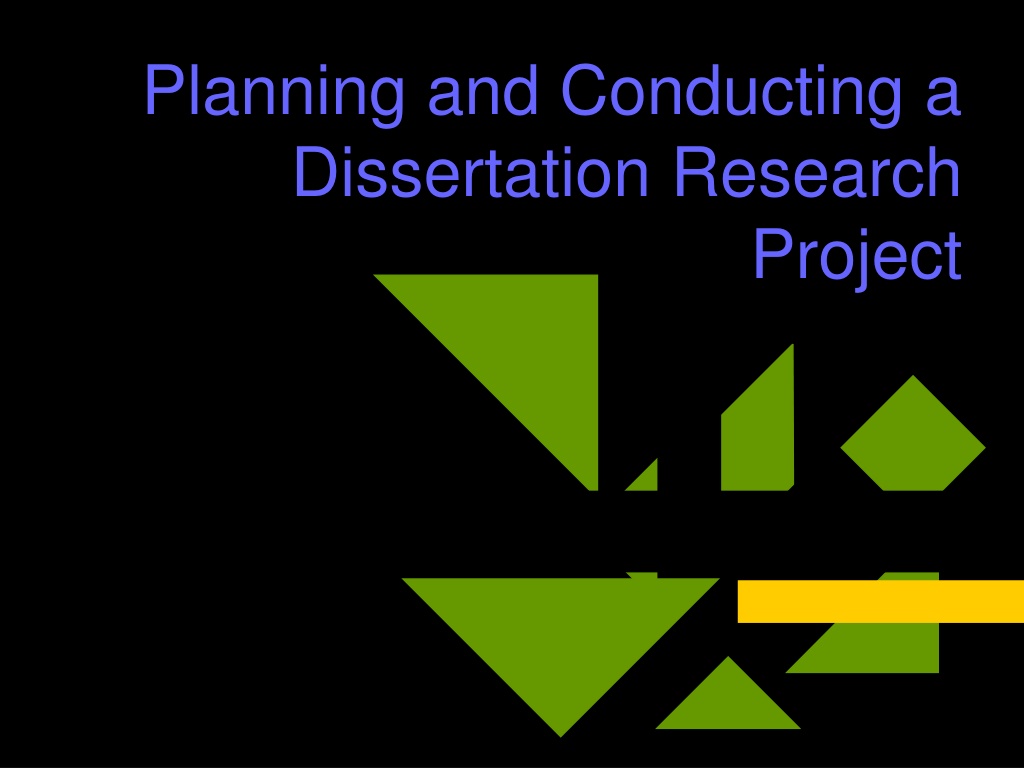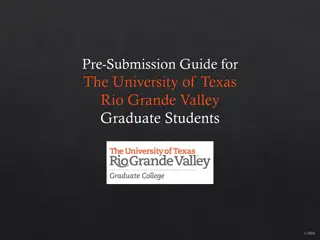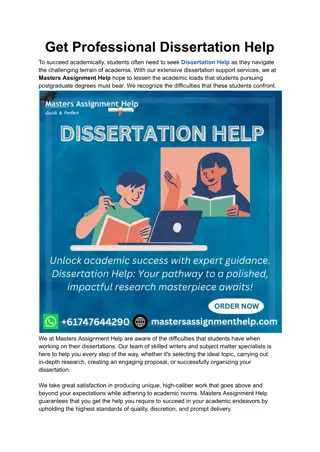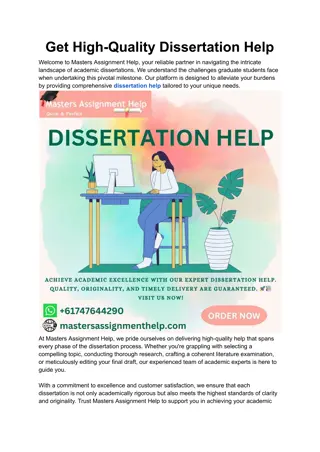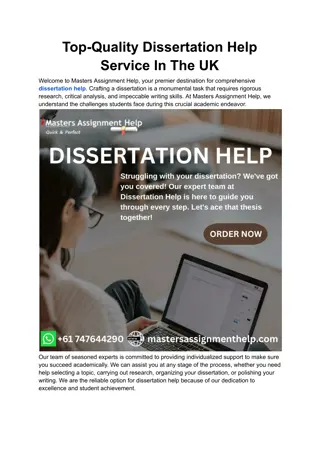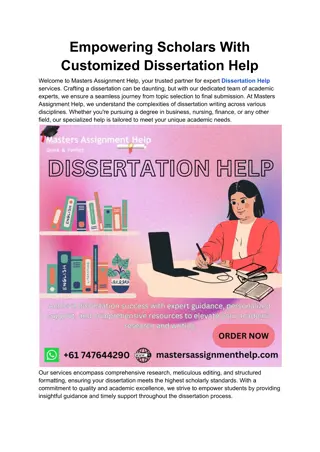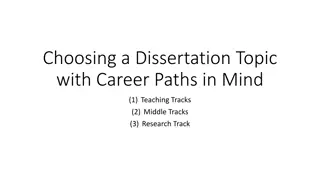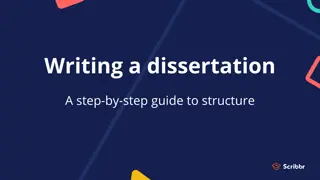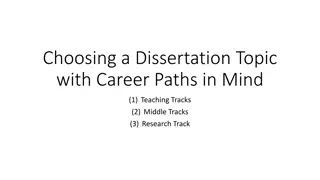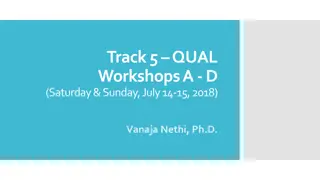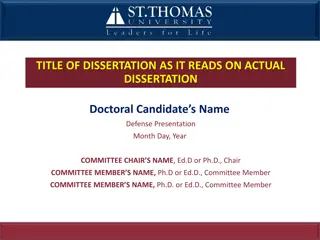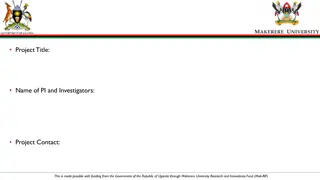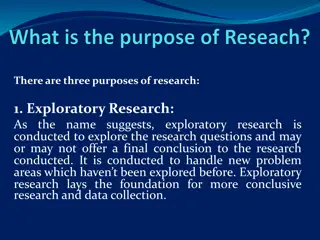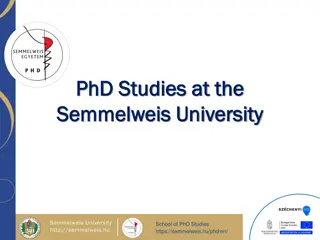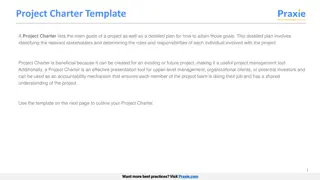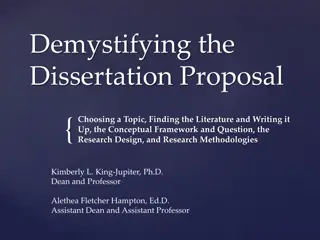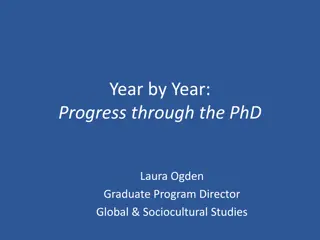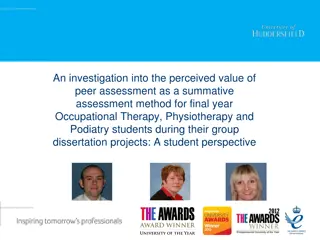Dissertation Research Project Guide
Understand the structure of a dissertation, when to start writing, what a thesis entails, and how to navigate the process successfully. Get insights on the good and bad news about undertaking a master's dissertation.
Download Presentation

Please find below an Image/Link to download the presentation.
The content on the website is provided AS IS for your information and personal use only. It may not be sold, licensed, or shared on other websites without obtaining consent from the author.If you encounter any issues during the download, it is possible that the publisher has removed the file from their server.
You are allowed to download the files provided on this website for personal or commercial use, subject to the condition that they are used lawfully. All files are the property of their respective owners.
The content on the website is provided AS IS for your information and personal use only. It may not be sold, licensed, or shared on other websites without obtaining consent from the author.
E N D
Presentation Transcript
Planning and Conducting a Dissertation Research Project
The Good News You only have to write ONE Master dissertation At the end, you will graduate
The Bad News Writing a thesis is hard, painful work
Dissertation Structure The Bad News Title page Abstract (optional) Some people never manage to write one Contents page Acknowledgements (optional) Introduction, including statement of scope, aims / questions, context, methods, and chapter outline Chapters - analysis of primary texts; for creative practitioners, exploration of writing / filmmaking styles that have inspired you & reflection on process Conclusion - for creative practitioners, self-evaluation; summary of findings and implications for our understanding of the topic Bibliography (& filmography, if appropriate)
Dissertation Structure Title page Dedications Acknowledgments(optional) Abstract Contents page General Introduction, including statement of scope, aims / questions,context,methods,and chapter outline Chapters practitioners, exploration of writing / filmmaking styles that have inspired you & reflection on process - analysis of primary texts; for creative General evaluation; summary of findings and implications for our understanding of the topic Conclusion - for creative practitioners, self- Bibliography
Ok, when do I start? So I m motivated When do I actually start writing my thesis?
Ok, when do I start? So I m motivated When do I actually start writing? 6 months at least before the viva? Don t worry, it s never too late to start
What is a thesis? Demonstration of an understanding of the state of the art Critical appreciation of existing work A novel contribution Evaluated systematically
Thesis Opens a new area Provides unifying framework Resolves long-standing question Thoroughly explores area Contradicts existing knowledge Experimentally validates theory Provides empirical data Develops new methodology Develops new tool
Read some theses? Good way to get a feel for the beast Library Online theses
Stages 1. choosing a topic; 2. developing a research question; 3. effective planning research; 4. being organised and methodical while conducting your research; 5. reporting the research. of the
1. Choosing a topic Talk to others: what topics are other students considering? Look at other writing: set aside some time to spend in the library, skimming through the titles of research papers in your field over the past five years, and reading the abstracts of those you find most interesting.
Look through the dissertations of previous students department: the topics may give you inspiration, and they may have useful suggestions for further research. Think about your own interests: which topic have you found most interesting, and is there an element that could be developed into a research project? in your
Is there a related topic of interest to you that has not been covered in the syllabus, but would fit with the theory or methodology you have been working with? Be extra critical: is there something in your course so far that you have been doubtful about, or which you think needs further study?
Read about an interesting topic and keep asking the question Why? : this may identify question you could address. Remember that a research study can: replicate an existing study in a different setting; explore an under-researched area; extend a previous study; a research
develop or test out a methodology or method; apply a theoretical idea to a real world problem.
IMPORTANT You should think realistically about the practical implications of your choice, in terms of: the time requirement; necessary travelling; access to equipment or room space; access to the population of interest; and possible costs.
So, how do I start? When you start ask the five Ws : What? Why? Who? Where? When?
What is your research? Why do you want to do the research? Who will be your participants? Where are you going to conduct your research? When are you going to do your research?
Suggested Topics Using Short Stories To Teach ONE Of Language Skills Using Narratives In The Classroom: What s The Use Of Story? Instructional Strategies For Literature Classroom -Community
Leading Literature Classroom Discussions: How Do I Get Them to Talk about Literature? Writing about literature: How do I get Students to write about literature? Goals for teaching literature: What does it mean to teach literature?
Literature as an important component of language arts
Literature as a tool for Language learning (at university ) Short stories Poems Novels Plays Song Lyrics
Teaching Bible/Quran through Literature Literature integration in Language Curriculum( Middle or secondary school) Teaching literature in the university context (Higher Education): approaches, methods and techniques.
Teaching Western Literature To EFL Students The Role and Uses Of Literature In The EFL Language Classroom Women Writing and The Fight For Gender Equality Women Image and Role Depiction In Western Literature
The Portrayal of the American Society in Contemporary American Fiction The Authenticity of the Colonizer's Language in Modern African literature: A Comparative Study of Ngugi's Matigari and Achebe's No Longer at Ease Aspects of Neo-Colonialism in Ngugi's Petals of Blood and Ayi Kwei Armah's The Beautyful Ones Are Not Yet Born
2. Developing a Research Problem/ Question Try describing your topic as a research problem that sets out: the issue that you are going to be investigating; your argument or thesis (what you want to prove, disprove, or explore); and the limits of your research (i.e. what you are not going to be investigating).
It is important that you establish a research problem at, or close to the start of, your project. It is one of the key tools you have, to ensure that your project keeps going in the right direction. Every task you undertake should begin with you checking your research problem and asking will this help me address this problem? .
Research problem Commentary Feminism in Literature This sets out your research field but does not frame a research problem because it is too general. You do not have time to study everything about a topic, so you should focus on an aspect that you are interested in
Research problem Commentary This is a much better research problem as it establishes an argument (influence of Feminism on English Literature). However, it is still quite general and could be improved by further focus. Examination of the influence of Feminism on English Literature
Research problem Examination of the influence of Feminism in Virginia Woolf s title of novel Commentary This is a much better research problem
What Makes a Good Research Problem Statement? A good problem statement begins by introducing the broad area in which your research is centered and then gradually leads the reader to the more narrow questions you are posing. The statement needs not be lengthy but a good research incorporate the following features: problem should
1. Convincing topic Simple curiosity is not a good reason to pursue a research study. The problem that you choose to explore must be important to you, your readers, and to a larger community you share. The problem chosen must be one that motivates you to address it.
2. Supports multiple perspectives A general rule is that a good research problem is one that would generate a variety of viewpoints from an audience made up of reasonable people.
3. Researchable Choose research problems that can be supported by the resources available to you.
The problem formulation consists of just one sentence and should make it clear to everyone what research problem you aim to address and to whom and where it is relevant. In other words, the problem formulation is the heart (or core) of your thesis to which you should always return if you lose track during your further research and writing process.
Outline your topic Background Aim Research problem Research question(s) with or without hypothesis(es) Research Methodology Population Data Collection Procedure Data Analysis Procedure Limitations
EXERCISE 1 Have a look at the three projects below and see if you can spot any potential problems. What questions would you ask to make the researchers focus in on their proposed project? Do you have any suggestions for the improvement of these statements?
Statement 1: This research aims to find out what students literature. think about Statement 2: This study aims at finding out how many students at department of English are interested in using ICT s to learn literature. the
HOMEWORK With your partner, prepare a research problem.
